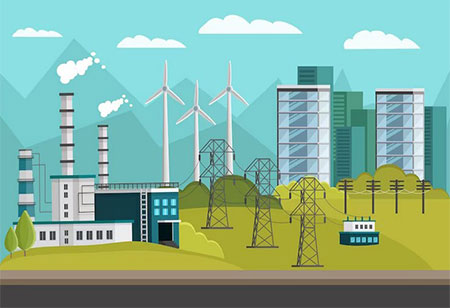
The global energy sector is undergoing a radical change driven by the pursuit of sustainability and efficiency. Surprisingly, smart grids have emerged as the focal point as people seek innovative power plant design from power plant consultants to generate, distribute, and consume power. Integrating smart grids with traditional power plants has become a linchpin, leading to in- novative power plant design solutions that promise a more sustainable and resilient energy future.
Emergence of Smart Grids as Alternative Power Plant Design Solutions
Historically, power plants have struggled with inefficiencies and environ- mental concerns. Traditional designs, characterized by centralized gene- ration and rigid structures, struggled to adapt to the changing needs of modern society. The limitations of these conventional plants prompted the exploration of alternative solutions via power plant engineering services that could address the growing demand for cleaner, more flexible energy.
Smart grids are a technological leap transforming how we manage and distribute electricity. Smart grids represent a departure from the traditional, one-way flow of electricity, as they are intelligent, interconnected systems that leverage advanced communication and control technologies to optimize power generation and distribution. The need for such grids became apparent as the energy sector diversified, incorporating renewable sources, distributed generation, and a burgeoning demand for real-time data.
Integrating Smart Grids with Power Plants
As said earlier, integrating smart grids with power plants marks a paradigm shift in the energy sector. Power plants are becoming integral components of a larger, interconnected grid, as there are no longer isolated entities. This integration facilitates enhanced communication, allowing power plants to respond dynamically to fluctuations in demand, optimize energy production, and con- tribute to grid stability.
The influence of smart grids on power plant design solutions is profound, as notable power plant consultants stated. Flexibility and adaptability are now at the forefront of considerations. Power plants are no longer rigid structures with fixed outputs. They are designed to seamlessly integrate with smart grids, adjusting their operations in real-time to meet the grid and market demands.
Incorporating Advanced Monitoring and Control Systems
One of the key transformations in power plant design is a power plant engineering consultant incorporating advanced monitoring and control systems. Smart grids enable real-time data exchange between power plants and the grid, allowing for precise monitoring of performance metrics. This data-driven approach empowers operators to make informed decisions, optimize efficiency, and predict and prevent potential issues before they escalate.
It is possible for a power plant to autonomously adjust its output based on the demand detected by the smart grid. This level of responsiveness ensures a more reliable power supply and contributes to the overall stability of the grid. The marriage of advanced monitoring and control systems with power plant design testifies to the transformative impact of smart grids.
Integrating Renewable Energy Sources and Distributed Generation
Smart grids open the door to a more sustainable energy mix by seamlessly integrating renewable energy sources and distributed generation. Traditional power plants were often characterized by a reliance on fossil fuels, contributing to environmental degradation. In contrast, modern power plant designs employ power plant consulting services to leverage the capabilities of smart grids to incorporate renewable sources such as solar, wind, and hydropower.
Integrating renewables reduces the carbon footprint of power plants and enhances grid resilience. As a result, smart grids contribute to a more robust and adaptable energy infrastructure by diversifying the energy sources feeding into the grid.
Environmental and Economic Impacts
The environmental and economic implications of smart grid-enabled power plants are substantial. Reducing carbon emissions is a critical contribution to mitigating climate change. Smart grids usher in a more sustainable and environmentally conscious energy sector by optimizing the use of renewable energy sources and promoting energy efficiency.
Moreover, the economic benefits are noteworthy. Power plant consultants help leverage and maximize smart grids and contribute to cost savings through improved efficiency, reduced downtime, and better asset management. The long-term economic viability of power plants is bolstered, creating a win-win scenario for stakeholders and the environment.
Wrap Up
The evolution of smart grids and their influence on power plant design solutions is a vital chapter in the ongoing narrative of the energy sector. The transformative impact is evident in modern power plants' enhanced flexibility, efficiency, and sustainability. Smart grids help address traditional power plant's shortcomings and lead to a more resilient, adaptive, and sustainable energy future. The journey is ongoing and power plant engineering services lead toward a sustainable energy future with innovative power plant designs.
We use cookies to ensure you get the best experience on our website. Read more...